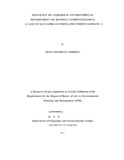| dc.description.abstract | Over the last few decades companies have begun to consider the environment factor in their corporate and marketing strategic decisions. Growing pressure from all stakeholders is compelling companies to take environmental responsibility of all their activities. The key to success is for organizations to understand, integrate and manage environmental concerns as an everyday part of doing business and decision-making. Proactive corporate environmental management ensures that companies achieve both environmental excellence and long-term profitability, attract green consumers or reduce costs. In other words, corporate environmentalism can provide both environmental and socioeconomic benefits to the public and the organization (the triple bottom line). East African Portland Cement Company in Kenya was chosen as a case in this study.
The main objective of this study was to establish the impact of corporate environmental performance on business competitiveness. To achieve this objective the study utilized both secondary and primary sources of data. In the field study questionnaires were administered and interview data was captured from selected respondents. Content analysis and statistical tools of analysis were used to analyze data i.e. the qualitative data was cleaned and coded and interpreted by attaching significance to the emerging themes and patterns. While analyzing quantitative data, the Yes and No responses were re-coded into dummy scores which were evaluated in terms of expected scores. The expected scores were assigned most favoured score of two while less favoured assigned the value of one. All the results were added and averaged to get an environmental score. The environmental scores were tested for difference by department using Kruskal Wallis H test and by gender using Man- Whitney U test.
Data analysis indicated that integrating environmental concerns can result to .Qoth environmental excellence and sustainable profitability e.g. the CDM project initiated by EAPCC, had the potential to reduce the overall cost of production and hence position the organization competitively in the cement industry. The study also established that environmental initiatives such as tree planting initiatives and the CDM project that the organization had initiated offer an opportunity for EAPCC to build its corporate image and promote its brand by associating the organization with responsible business.
The findings also indicated that reduction of production cost and increased operation efficiency in EAPCC are partly attributed to installation of modem environmental technology. The study recommended to the organization to develop stronger marketing strategies by linking corporate environmental related initiatives with responsible business practices and strengthen corporate policy instruments that promote practical approach of integrating environmental innovations in business operations. | en_US |

